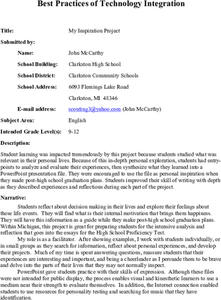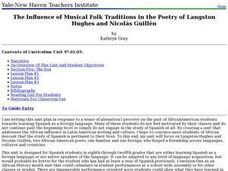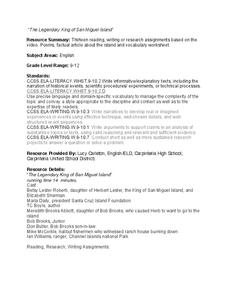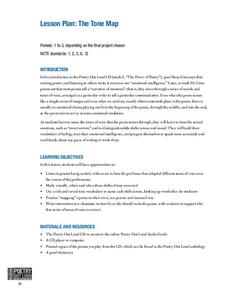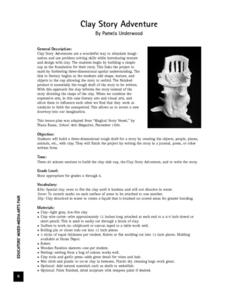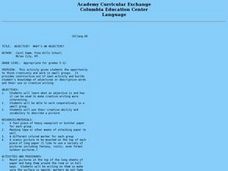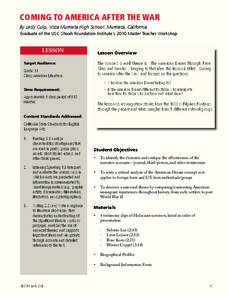Curated OER
Out of the Dust
Seventh graders read a book of poems called "Out of the Dust". In groups, they research the Dust Bowl and how it affected people living through the Great Depression. Using the text, they identify the theme and key turning points and...
Curated OER
My Inspiration Project
Students reflect about decision making in their lives and explore their feelings about these life events. They create 100 word narratives and poems with specific details then create Power Point presentations of their project.
Curated OER
Deduction
Students investigate the linguistic devices used by writers to create meaning. In this writing instructional activity, students discover why writers write in different ways showing examples of different types of text. After reading each...
Curated OER
School Day
Students participate in a lesson that involves writing a persuasive essay. They use the prompt of "extending the school day". The paper should contain correct elements of sentence structure with clear purpose that is supported with...
Curated OER
Poetry Cut-Ups
Students write with controlled and/or subtle organization. They sustain a logical order. Students include a recognizable beginning, middle and end. Students begin by selecting a narrative poem.
Curated OER
Responding To Rembrandt's Work Through Poetry
Students write poetry in response to Rembrandt's landscapes and portraits. They create accompanying illustrations based on interpretations of Rembrandt's work and present them along with the poems in book format.
Curated OER
The Influence of Musical Folk Traditions in the Poetry of Langston Hughes and Nicolás Guillén
Students listen and explore how African-American culture relates to learning Spanish as a foreign language. Poetry, music, and history are utilized while learning about Langston Hughes and Nicolas Guillen.
Curated OER
Poetry
Students write a poem. In this language arts lesson, students discuss what they hear and see in a garden. Students write a poem about the sights, sounds and smells of the garden.
Curated OER
Nature Walk Poem
Third graders read poetry inspired by nature. They talk a walk in nature or in their neighborhood with paper and pen and write down feelings and perceptions. They write a poem about their walk and share it with the class.
Curated OER
Narrative Literature Response Letters
Third graders write endings to a story that has already been written. They offer alternative endings in their version. The lesson includes a rubric that is to be given to the students in order that they know the requirements.
Curated OER
Click! Writing Through Digital Photography
Young scholars take their own digital photographs and scan them onto the computer. For each photograph, they write about them and use the internet to research their subject in the photo more throughly. They are graded based on a rubric...
Channel Islands Film
The Legendary King of San Miguel: Lesson Plan 3 - Grades 9-12
The documentary, The Legendary King of San Miguel Island, introduces the fascinating tale of Herb Lester, his family, and their life on San Miguel Island. Viewers have an opportunity to expand their study of the island and of Lester's...
Curated OER
American Civil Rights Movement, Photo Essay
Students view photographs from the Civil Rights Movement and write an essay from the point of view of someone in the photograph. They artistically represent various aspects of the Movement.
Curated OER
Heroes, Legends and Folktales
Fourth graders read classic stories including "The Magic Brocade" and "St. George and the Dragon". They complete a series of lessons in which they compare stories and produce original narrative legends.
Curated OER
The Tone Map
Students listen carefully to a portion of the Poetry Out Loud CD. They focus on the tones the poet uses in his recitation of a poem. Then they map a poem of their own so that a classmate can read it using the tonal qualities intended...
Curated OER
Transforming Negatives to Positives
Students write diamonte poems that correspond to the double-exposed photograph they created. In this poetry and multimedia artwork lesson, students use the photographic process to create a double-exposed photo then create a diamonte...
Curated OER
Clay Story Adventure
Students build three-dimensional rough draft for a story by creating objects, people, places, animals, etc., with clay, and write story in a journal, poem, or other written form.
Curated OER
Adjective? What's an Adjective?
Mount a variety of pictures (fantasy, rustic, portraits, action) on large sheets of paper and post them around the classroom. Groups rotate from poster to poster, adding adjectives to describe each of the pictures. Writers use these word...
Curated OER
Say Hi to Haibun Fun
What is a haibun? With this interesting lesson, writers will experience the Japanese writing form haibun, identify elements important to Japanese writing styles, analyze a haibun, and compose their own. Different from the typical journal...
Curated OER
Ornithology and Real World Science
Double click that mouse because you just found an amazing lesson! This cross-curricular Ornithology lesson incorporates literature, writing, reading informational text, data collection, scientific inquiry, Internet research, art, and...
University of Southern California
Coming to America After the War
As part of their exploration of the American dream, class members examine primary source materials to compare immigrant experiences of those arriving early in our country's history to those arriving in the US after World War II. To...
Curated OER
Through the Looking Glass
An engaging and ambitious series of four lessons invites high schoolers to view art work, have group and class discussions, construct time lines, compile photos, and conduct research. Learners share their experiences, create...
Curated OER
Analyzing the Use of Irony in a Short Story
Ninth graders examine how literature connects to real-life and see how irony aids in the development of theme. They read Shirley Jackson's The Lottery, and discuss elements of foreshadowing and situational irony. Then learners will write...
Maryland Department of Education
The Concept of Identity Lesson 2: The Historical/Biographical Approach
"How does our environment shape our identity?" After researching biographical information about John Knowles and considering how these experiences are reflected in A Separate Peace, class members consider the strengths and weaknesses of...



